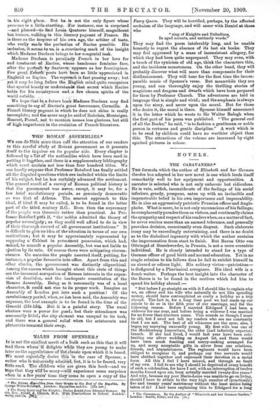TALES FROM BPENSER.f
IT is not the sMallest merit ota hook such as this that it will lead those whoitilt delights While they are young to make later on the acqnaintance of On classic upon which it is based. We must ealbeelallY: desire Ali in the case of Spenser, a writer who is tiniv,ersally aditdCd,-lint, it is to be feared, very little read. The "dhildren who are given this book—and we hope that the' 'tvllthe many—.Will experience some surprises when in a few Yen' time tlieycoin& to open a copy of the The Boman Asenthlits. from ttirittttt to. Qs Znd of ths Republic. By George Willis Botsford.: ,Loudon: bfacazillan and Co. [17s. net.] The Fury citi;en enji bur Knights: Etoi-ies Retold from Edmund Spenser. By the Rev. ajf b, M.A. :4,{Tipz Illizstrationa in Colour. London :
Seeley and Co. • " • . ,
Faery Queen. They will be horrified, perhaps, by the affected archaism of the language, and will sneer with Daniel at those who
"Sing of Knights and Palladines,
In aged accents, and untimely words."
They may find the poem intolerably long, and be unable honestly to regret the absence of its last six books. They may feel oppressed by a. mass of inconsistent allegory, for which they had been quite unprepared. They may even, with a touch of the cynicism of old age, think the characters thin, and the incidents monotonous. On the other hand, they will probably discover what will more than compensate for their disillusionment They will hear for the first time the incom- parable music of Spenser's verse. But meanwhile they are young, and can thoroughly enjoy the thrilling stories of magicians and dragons and dwarfs which have been prepared for them by Professor Church. The adventures are told in language that is simple and vivid ; and the emphasis is always upon the story, and never upon the moral. But for those who desire it, the moral is there. Spenser .himself announced it in the letter which he wrote to Sir Walter Ralegh when the first part of his poem was published. "The general end of all the Booke," he said, "is to fashion a gentleman or noble person in vertuous and gentle discipline." A work which is to be read by children could have no worthier object than this. The attractions of the volume are increased by eight spirited pictures in colour.
























































 Previous page
Previous page